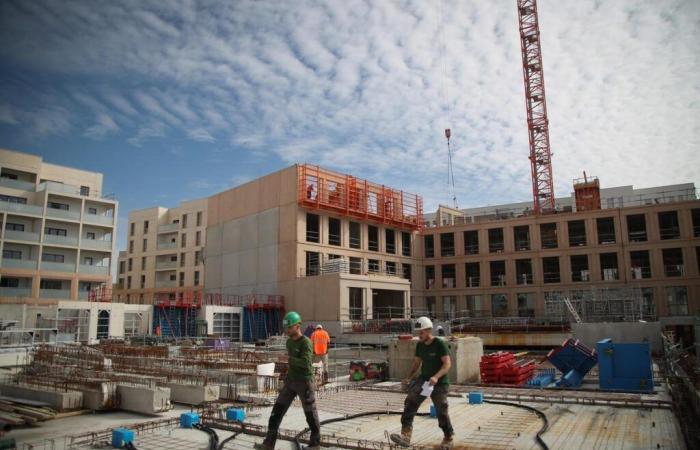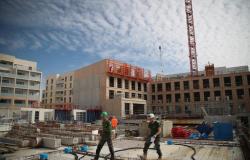
LThe positive signals are indeed there. Fall in mortgage rates, return of banks to the market, new appetite shown by households to invest… But developers do not see the end of the crisis. “The market is seizing up. Firstly, with regard to the projects under construction when the crisis occurred: some were the subject of repurchases by the Caisse des Dépôts et Consignations through block sales to settle the operations,” explains Gonzague Douniau, president of the Federation of Real Estate Developers (FPI) of Nouvelle-Aquitaine. “Then on current operations: permits have been filed, obtained and served; the question is: should you throw or not? The work, the technical costs have evolved in relation to marketing, which is difficult. So it's a gamble. Today, promoters tend not to launch operations. Finally, regarding future operations: the difficulty is to successfully complete them in current market conditions, so these operations are much fewer in number than before. »
Resolve customers
And the latest figures for real estate development do not encourage taking risks. In the mainland, the drop in prices initiated in the first quarter of 2024 continues at 4,696 euros per m², a drop of 2.8% (-7% compared to the second quarter of 2023) and at 4,833 euros/m² parking included on average in Bordeaux (-9% over a rolling year). And if prices fall, sales do not recover, with a drop of 50% in two years.
“We continue to sink into a whirlwind of which we do not see the end,” confirms Christophe Duportal, president of the South-West Real Estate Observatory (Oiso). “What is worrying is the level of hard stock, that is to say apartments not sold even though the programs have been delivered. This is very problematic for promoters. We have more than 200 housing units in stock in the metropolis, mainly large types. »
“What is worrying is the level of hard stock, that is to say apartments not sold even though the programs have been delivered”
Promoters fear a year 2024 on the trend of 2023, despite some signs of improvement. The fall in property loan rates, first of all, even if it seemed to stall this summer: after a rapid fall in the first half of the year, the average property loan rate fell more slowly between June and August, by 3.65 % to 3.62% – according to the Housing Credit Observatory / CSA.
Towards the 3% rate?
The return of banks to the real estate loan market is also a sign of hope: loan production increased by 23.1% in August (compared to -48.8% in August 2023) and by 48.6% for the number of loans granted (-47.3% a year ago). This return of banking supply coincides with a clearing in the housing purchase intentions of households, which are returning to their levels at the start of 2022, that is to say when credit conditions were described as exceptional, with rates close to 1%.
A further reduction in the key rates of the European Central Bank (ECB), announced a few days ago, gives hope for a further gradual reduction in real estate loan rates which could reach 3% over twenty years at the start of next year. . In Gironde, developers have noted a resumption of sales to investors which represent 40% of sales in the second quarter, while potential buyers say they are mainly tempted by rental investment.
Renovation
Will these new market conditions be enough to reassure developers? They now consider that improvement will take a very long time to come and that they will have to adapt, rethink their profession, with some already turning towards renovation and rehabilitation. A sign of the evolution of the market: start-ups have pivoted since the crisis or invented a financing offer geared towards renovation.
However, even at a time of land scarcity and Zero Net Land Artificialization (ZAN) imposing restrictions on developers and builders, rehabilitation is far from being the solution, especially as it remains very expensive. “Rehabilitation remains a niche profession on small programs, except when it comes to city entrance transfers. It's a different profession than new construction, more technical. Operators will have to adapt their model, diversify into mixed, therefore acquire other skills than just housing and only rehabilitation, explains Christophe Duportal. It’s a sector that expresses needs, so we always have hope. Before the dissolution, a number of subjects were on the government table. We hope that a new government with a dedicated Housing Minister will allow these subjects to be taken up again. »
New tax exemption system
The Court of Auditors, in its evaluation of tax assistance for rental investment Pinel, which allows households investing in housing to rent them to benefit from a tax reduction, recognizes that the system has mobilized savings from individuals to the housing sector. It also contributed to the triggering of real estate operations which could not have been successful, or less quickly, without this orientation of individual savings. The Court of Auditors also recognizes that the system has enabled rather modest households to find accommodation in tense areas in comfortable, high-quality and energy-efficient housing. But she regrets that its effects are not precisely measurable. While the system has mobilized 7.3 billion euros in ten years. With Pinel set to disappear at the end of the year, some are already calling for a new tax system which would encourage investors to return to the market, and therefore promoters to launch new programs. But not only that. “We should again grant the Zero Interest Loan (PTZ) to first-time buyers for building land,” believes Guillaume Seguy, vice-president of the South-West Real Estate Observatory (Oiso).





